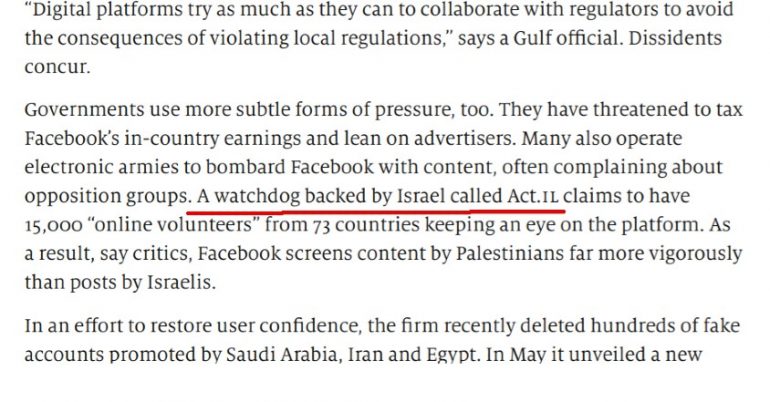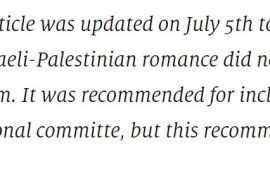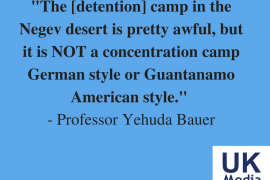The following paragraph in an article at The Economist “Facebook has been bending to the will of Arab despots” lays out their proposition:
In a region ruled by despots, Facebook claims to give “free expression maximum possible range”. That has won it a vast following. The platform has more users in the Gulf states than anywhere else in the world, relative to the population. It is the main source of news for many Arabs. Some even credit it for the Arab spring protests of 2011. But since going public in 2012, Facebook has grown more mindful of the authoritarians who provide it with access, say critics, and less hospitable to activists. In recent months it has culled hundreds of users from Tunisia to Iran and deleted hundreds of thousands of posts.
…
Arab governments have passed laws against cybercrime and online terrorism to cow social-media firms and their users. Facebook “tries to comply” with local codes.
Then, in the penultimate paragraph, it manages to include Israel – in an article, let’s remember, about Facebook bending to the will of Arab despots‘:
Governments use more subtle forms of pressure, too. They have threatened to tax Facebook’s in-country earnings and lean on advertisers. Many also operate electronic armies to bombard Facebook with content, often complaining about opposition groups. A watchdog backed by Israel called Act.il claims to have 15,000 “online volunteers” from 73 countries keeping an eye on the platform. As a result, say critics, Facebook screens content by Palestinians far more vigorously than posts by Israelis.
The Economist got it wrong.
ACT.IL is a grassroots Israeli organisation, and is not backed, either financially or in any other way, by the Israeli government – a fact we confirmed earlier with a spokesman from the group.
But, in addition to that factual error, the reference to ACT.IL is fundamentally misleading in the context of the article.
Unlike the “authoritarian” Arab regimes which are the focus of the piece, who lean on Facebook to stifle democratic dissent within their own countries, ACT.IL merely disseminates information to activists on Facebook perceived as violating their rules, such as incitement to violence or racism. Then, individual ACT.IL activists use this information to flag the hateful posts. It’s then of course entirely up to Facebook moderators how they respond.
The Economist’s attempt to makes grassroots pro-Israel activists’ efforts to get extremist content removed from Facebook sound like a nefarious government plot to stifle dissent is supremely dishonest and sadly predictable.
Related Posts
- Editors’ Note on cancel culture and misuse of the term “antisemitism” (CAMERA UK)
- Black Lives Matter, JVP’s ‘Deadly Exchange’ and Israel (CAMERA)





